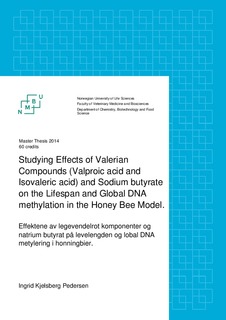| dc.contributor.author | Pedersen, Ingrid Kjelsberg | |
| dc.date.accessioned | 2014-07-28T10:48:34Z | |
| dc.date.available | 2014-07-28T10:48:34Z | |
| dc.date.copyright | 2014 | |
| dc.date.issued | 2014-07-28 | |
| dc.identifier.uri | http://hdl.handle.net/11250/198608 | |
| dc.description.abstract | Abstract
Epigenetic modifications have been linked to age related decline. These modifications are changes in the DNA that does not alter the sequence itself, but still affect gene expression. Epigenetic modifications include histone modification, DNA methylation and chromatin remodeling. Bioactive food compounds and different nutrients have been found to affect these mechanisms in various model organisms. By inducing epigenetic modifications when ingested, some of these compounds have shown to extend lifespan. The honey bee’s short lifespan, and that it possesses an epigenetic machinery homologous to that found in humans, can make it a suitable model organism for studying these mechanisms.
The main goal of this study was to investigate the effects of sodium butyrate, and two compounds of the valerian plant extracts (valproic acid and isovaleric acid), on the lifespan in the honey bee. By conducting ELISAs and Western blots, I aimed to test if levels of DNA methylation and histone acetylation are affected by these nutrients.
Here I show that low doses of isovaleric acid extend the lifespan of honey bees. To my best knowledge, this represents the first evidence of isovaleric acid exerting life-extending effects in any animal or human. I also show that increasing concentrations of this compound reduce the bees’ food intake. High concentrations of valproic acid showed life shortening effects, and sodium butyrate showed minor effects only. The ELISAs did not reveal any modifications in global DNA methylation, and the differences in histone acetylation could not be tested, as Western blotting was not feasible.
This study provides good prospects for future studies on how isovaleric acid, valproic acid and sodium butyrate can affect lifespan and aging. In particular the results from testing isovaleric acid may inspire future work to test if potential health promoting effects can be found in other organisms as well, and to address the mechanisms through which lifespan extension is achieved. | nb_NO |
| dc.language.iso | eng | nb_NO |
| dc.publisher | Norwegian University of Life Sciences, Ås | |
| dc.subject | Biotechnology | nb_NO |
| dc.subject | Molecular biology | nb_NO |
| dc.subject | VDP::Matematikk og Naturvitenskap: 400::Basale biofag: 470::Molekylærbiologi: 473 | nb_NO |
| dc.subject | VDP::Medisinske Fag: 700::Basale medisinske, odontologiske og veterinærmedisinske fag: 710::Medisinsk mikrobiologi: 715 | nb_NO |
| dc.title | Studying effects of valerian compounds (valproic acid and isovaleric acid) and sodium butyrate on the lifespan and global DNA methylation in the Honey bee model | nb_NO |
| dc.title.alternative | Effektene av legevendelrot komponenter og natrium butyrate på levelengden og global DNA metylering i honningbier | nb_NO |
| dc.type | Master thesis | nb_NO |
| dc.description.embargo | 2017-05-15 | |
| dc.source.pagenumber | 90 | nb_NO |
| dc.description.localcode | M-BIOTEK | nb_NO |
